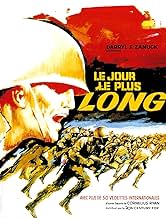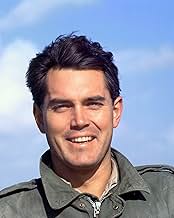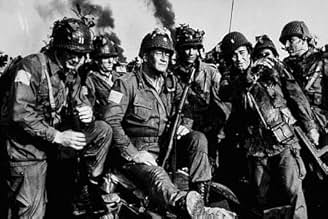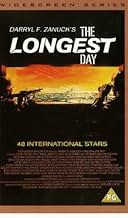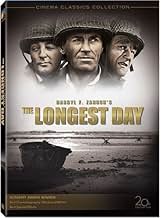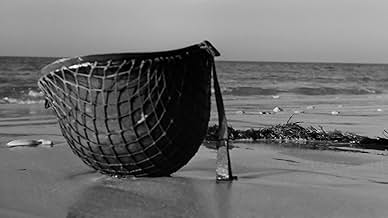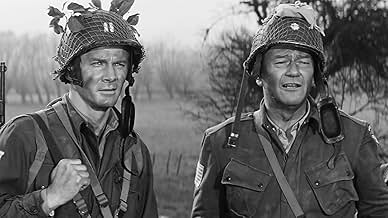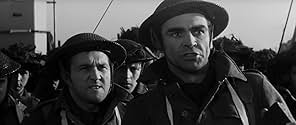IMDb RATING
7.7/10
62K
YOUR RATING
The events of D-Day, told on a grand scale from both the Allied and German points of view.The events of D-Day, told on a grand scale from both the Allied and German points of view.The events of D-Day, told on a grand scale from both the Allied and German points of view.
- Won 2 Oscars
- 8 wins & 6 nominations total
Irina Demick
- Janine Boitard
- (as Irina Demich)
Featured reviews
The Longest Day works on several levels - the most obvious being the "don't blink or you might miss several" nature of the Star-Studded cast. Much of the cast works very well (Sean Connery's little comedy double act with Norman Rossington is an unexpected highlight). Some less so, and some is just downright tokenism - Rod Steiger getting all of 43 seconds on-screen for example. But overall, it's always a watchable movie - beautifully shot.
Some previous comment have surprised me, particularly the assertion that The Longest Day is, in any way, a "pro-war" film. I'm not sure if there *is* such a thing, but if there is then The LOngest Day certainly doesn't fall into this category - the scene of bewilderment between Richard Burton and Richard Beymer at the end about the confusion and directionlessness of war is the perfect example, ending with the memorable line "I wonder who won".
I'm also surprised that a European reviewer should have accused this film, of all world war II movies, of being American propoganda. I wonder how many other WWII films include both German and (almost unqiuely) French perspectives of the war to such an extent that almost half of the dialogue in them is in a language other than English. I find the German sequences in The Longest Day to be amongst the most interesting historically and dramatically.
The film is certainly as accurate as it's possible for a fictional movie to be - the list of advisors that it had working on it should prove that - including many people who are portrayed by actors in the movie itself. These include the characters played by Peter Lawford, Richard Todd and Kenneth More, along with several of the German field officers. Little touches that seem utterly out of place (like the nuns procession through the French village bringing a temporary ceasefire) are actually historically spot-on.
The final problem for the modern reviewer, of course, is the inevitable comparison between this film and Saving Private Ryan. But, as several other contributors have noted, SPR is not only the product of a different age with a different view of these events - historical as opposed to something which happened so recently that half of the audience are likely to have lived through them. But, ultimately, something usually forgotten about Operation Overlord is that Omaha Beach was merely one battle of a very long day indeed. Americans tend to focus on it because of the death toll, but the taking of Utah, Sword and Gold were just as important to the overall outcome. The Longest Day is a film about five beaches, many battles, and many men - some, as Richard Burton says, dead, some crippled and some lost. It is an anti-war film which proves that you can be anti-war and still celebrate and acknowledge heorism. The heroism of the young American and British troops, falling face-first into the salt water of the Normandy killing grounds. The incredible bravery of the Rangers who scaled the cliffs at Pointe du Luc on and, ultimately, meaningless mission. The heroism of the two Luftwaffe pilots commanded to face the invading armies alone, and who did so (another historically accurate point).
The Longest Day is a historic film about a historical event and it should be viewed as such.
9/10
Some previous comment have surprised me, particularly the assertion that The Longest Day is, in any way, a "pro-war" film. I'm not sure if there *is* such a thing, but if there is then The LOngest Day certainly doesn't fall into this category - the scene of bewilderment between Richard Burton and Richard Beymer at the end about the confusion and directionlessness of war is the perfect example, ending with the memorable line "I wonder who won".
I'm also surprised that a European reviewer should have accused this film, of all world war II movies, of being American propoganda. I wonder how many other WWII films include both German and (almost unqiuely) French perspectives of the war to such an extent that almost half of the dialogue in them is in a language other than English. I find the German sequences in The Longest Day to be amongst the most interesting historically and dramatically.
The film is certainly as accurate as it's possible for a fictional movie to be - the list of advisors that it had working on it should prove that - including many people who are portrayed by actors in the movie itself. These include the characters played by Peter Lawford, Richard Todd and Kenneth More, along with several of the German field officers. Little touches that seem utterly out of place (like the nuns procession through the French village bringing a temporary ceasefire) are actually historically spot-on.
The final problem for the modern reviewer, of course, is the inevitable comparison between this film and Saving Private Ryan. But, as several other contributors have noted, SPR is not only the product of a different age with a different view of these events - historical as opposed to something which happened so recently that half of the audience are likely to have lived through them. But, ultimately, something usually forgotten about Operation Overlord is that Omaha Beach was merely one battle of a very long day indeed. Americans tend to focus on it because of the death toll, but the taking of Utah, Sword and Gold were just as important to the overall outcome. The Longest Day is a film about five beaches, many battles, and many men - some, as Richard Burton says, dead, some crippled and some lost. It is an anti-war film which proves that you can be anti-war and still celebrate and acknowledge heorism. The heroism of the young American and British troops, falling face-first into the salt water of the Normandy killing grounds. The incredible bravery of the Rangers who scaled the cliffs at Pointe du Luc on and, ultimately, meaningless mission. The heroism of the two Luftwaffe pilots commanded to face the invading armies alone, and who did so (another historically accurate point).
The Longest Day is a historic film about a historical event and it should be viewed as such.
9/10
The previous comments about Canadian participation in the Normandy invasion were significant - insofar as there weren't very many. One of the five Normandy beaches was Canadian (Juno), but there is almost no mention of this in The Longest Day, and I'm sure that one would be hard pressed to find many Americans (and not a whole lot more Canadians) who know this. Unfortunately, it is movies such as this and other popular media that shape the historic knowledge of people on both sides of the border. In the near absence of Canadian content, I find it ironic that a young Canadian (Paul Anka) not only played a part in the movie as an American soldier, but also wrote the theme music. I find it also ironic that the legendary rifle used by US soldiers during WW2 and shown in this movie was designed by a Canadian as well (Garand is a French Canadian name). The cruelest irony, of course, is the fact that thousands of Canadian soldiers were maimed or lost there lives on 6 June 1944 and the days thereafter, with virtually no acknowledgement in this movie. I have always enjoyed watching this movie, but it is unfortunate that I must use my imagination to see in it the heroic and selfless wartime effort of my father's generation, in similar fashion to viewers in the US and UK.
The Longest Day is one of the greatest war films ever. Bar none. The acting, the cinematography, the storline and the acuraccy are great. if any of you fans watch AMC watch the Backstory behind this movie. It's amazing that it was even made. This is Zanuck's greatest work. The perspective from the different combatants regardless of their rank is great. Like somebody else said it did not portray the Germans as cartoonish evil doers. It gave a good honest portrayal that I wish more war movies would have. As a history buff I love to see movies from other countries soldier perspectives. This captures it better than every other war movie. The only one that comes close is Tora, Tora, Tora. There is one drawback however and that is the rangers at Pointe De Hoc. They did find the big guns but,they were further inland and later destroyed before they could be used. Zanuck used this to show the futility and waste of war. Other than that is a classic with very few flaws. The comparison between SPR and TLD are well like comparing apples and oranges. Yes, SPR has gritty realism that stuns you, but like another reviewer said, this was 1962 and the movie was about the entire scope of the battle. It was not meant to be up close and personal like SPR. Many of us appreciate movies from different perspctives. This is not a movie you should not rent. You should own it as part of your video collection. This movie may appear to be pro-war and patriotic, but Zanuck himself said he wanted to make an anti-war film. I think he did so magnificantly. He captured the essence of the book where Cornelius Ryan said he wrote about the men,not the battles. That is why Zanucks film is so successful. He captured the men and their feelings, whether they were American, British,German's or French and what they were feeling going into one WW2's most decisive battle. This is a Four Star Classic!!!!
This was an another one of these all-star casts that you don't see in more modern times, in which about everyone who was actor made an appearance....or it just seems that way. For those unfamiliar with this film, take a look back on the main page here and check out the famous names in this movie. Click the "more" under the cast overview and you'll see all the names. It's unbelievable. Some of them, to be fair, had very short roles in here, such as Henry Fonda, Rod Steiger and Roddy McDowell, but this is a real "Who's Who" of the acting profession in 1962. There are also a lot of German actors in here speaking German (with subtitles provided), perhaps numbering even more than the English-speaking stars. That's because the famous day of June 6, 1944, is seen from both sides of the conflict.
At three hours, it gives you plenty of D-Day World War II action. Almost two-thirds of the movie involves action from that famous invasion. In some spots, it just gets to be too much. Frankly, the whole film is too much and almost bogs down in too many areas....and it shouldn't, but it is a very technical film. And, for a film 45 years old, the action is pretty realistic. I thought the best shots were the overheads during one particular scenes when the Alies were going through a town.
I am anything but a WWII expert so how much detail of the infamous 'D-Day" here is correct, Since they went into such detail, I'll assume they were fairly accurate. I can't say but this movie educated me on the size of the task. I had no idea "D-Day" was this huge in scope: three million men and 5,000 ships??!!! Amazing.
At three hours, it gives you plenty of D-Day World War II action. Almost two-thirds of the movie involves action from that famous invasion. In some spots, it just gets to be too much. Frankly, the whole film is too much and almost bogs down in too many areas....and it shouldn't, but it is a very technical film. And, for a film 45 years old, the action is pretty realistic. I thought the best shots were the overheads during one particular scenes when the Alies were going through a town.
I am anything but a WWII expert so how much detail of the infamous 'D-Day" here is correct, Since they went into such detail, I'll assume they were fairly accurate. I can't say but this movie educated me on the size of the task. I had no idea "D-Day" was this huge in scope: three million men and 5,000 ships??!!! Amazing.
This is perhaps one of the most ambitious, epic WW2 films to have been made; certainly it is the last of the classic B&W films made about the subject. Featuring an all-star cast (John Wayne, Richard Burton, Kurt Jurgens... even a cameo by Sean Connery!), it comprehensively details the build-up and execution of the Normandy landings in 1944, taking care to show how the event was perceived by Allied and Axis soldiers and commanders, as well as the Free French resistance. This is a film that takes great care in documenting the events of the day, without lapsing into sickly sentimentalism or getting distracted with fictional characters' personal lives (a failing of many WW2 movies since about 1970), or over-emphasising any one nation's importance in the operation (although, admittedly, Canadians may feel a little short-changed).
Classic moments abound, notably the landing at St.Mere-Eglise and the soldier who gets caught in the church steeple, the frustrations of the front-line German commanders and fighters, and the numerous cameos for film nerds to keep track of.
If you want a wartime romance, or an appearance by Matt Damon or Ben Affleck, or long, loving shots of the Stars & Stripes in slo-mo, or a gritty blood'n'guts fest, you'll be disappointed. This film has broader concerns, and was made with much more thoroughness. There is no agenda at work here, pro-war or anti-. It is solely concerned with documenting Operation "Overlord" for the film-going public, and succeeds brilliantly; a shame then, that it has not made the top 50 war films list.
A must-see for any fan of war films.
Classic moments abound, notably the landing at St.Mere-Eglise and the soldier who gets caught in the church steeple, the frustrations of the front-line German commanders and fighters, and the numerous cameos for film nerds to keep track of.
If you want a wartime romance, or an appearance by Matt Damon or Ben Affleck, or long, loving shots of the Stars & Stripes in slo-mo, or a gritty blood'n'guts fest, you'll be disappointed. This film has broader concerns, and was made with much more thoroughness. There is no agenda at work here, pro-war or anti-. It is solely concerned with documenting Operation "Overlord" for the film-going public, and succeeds brilliantly; a shame then, that it has not made the top 50 war films list.
A must-see for any fan of war films.
Did you know
- TriviaWhile clearing a section of the Normandy beach near Pointe du Hoc, the crew unearthed a tank that had been buried in the sand since the original invasion. Mechanics cleaned it off, fixed it up and it was used in the movie as part of the British tank regiment.
- GoofsA compound fracture of the ankle indicates blood and/or protruding bones, of which Vandervoort's ankle had none. It also would have been impossible to put any weight on the ankle.
- Quotes
Flight Officer David Campbell: The thing that's always worried me about being one of the few is the way we keep on getting fewer.
- Crazy creditsThere is a 20-second overture on a black screen, no 20th Century Fox logo (in spite of this being one of their most expensive productions), and a six-minute cold open before the title is displayed. Apart from the title, there are no credits at the beginning of the film. All cast and crew credits are at the end of the film.
- Alternate versionsSome video copies omits Jean Servais scenes as a Free French admiral making a short speech to his crew before the shore bombardments starts.
- ConnectionsEdited into La guerre, la musique, Hollywood et nous... (1976)
Details
- Release date
- Country of origin
- Official site
- Languages
- Also known as
- The D. Day
- Filming locations
- Sainte-Mère-Eglise, Manche, France(parachutists landing in the village)
- Production company
- See more company credits at IMDbPro
Box office
- Budget
- $10,000,000 (estimated)
- Runtime
- 2h 58m(178 min)
- Color
- Black and White(original version)
- Aspect ratio
- 2.35 : 1
Contribute to this page
Suggest an edit or add missing content


